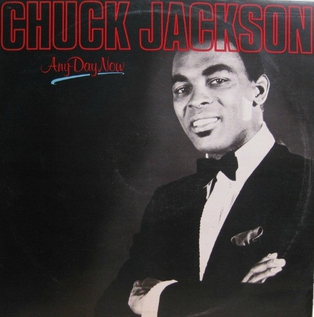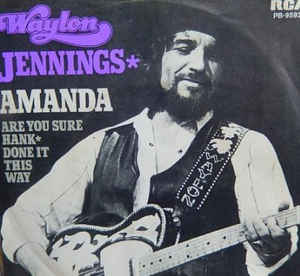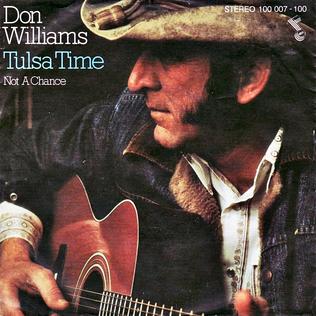Related Research Articles

"I Can't Stop Loving You" is a popular song written and composed by country singer, songwriter, and musician Don Gibson, who first recorded it on December 3, 1957, for RCA Victor Records. It was released in 1958 as the B-side of "Oh, Lonesome Me", becoming a double-sided country hit single. At the time of Gibson's death in 2003, the song had been recorded by more than 700 artists, most notably by Ray Charles, whose recording reached No. 1 on the Billboard chart.

Michael James Peterson is an American country music artist. He made his debut on the country music scene in 1997 with his second self-titled album, which produced five Top 40 hits on Billboards Hot Country Singles & Tracks, including the Number One hit "From Here to Eternity". Peterson's second album, 1999's Being Human, produced two more chart singles, and a third album, 2004's Modern Man, was issued only in Europe. Peterson also made a cameo appearance on an episode of Walker, Texas Ranger.

"Here You Come Again" is a song written by Barry Mann and Cynthia Weil, and recorded by American entertainer Dolly Parton. It was released as a single in September 1977 as the title track from Parton's album of the same name, topped the U.S. country singles chart for five weeks, and was nominated for the 1978 Grammy award for Best Female Pop Vocal Performance; it also reached number three on the U.S. Billboard Hot 100, representing Parton's first significant pop crossover hit.
"Honky Tonk Blues" was a hit country and western song written and performed by Hank Williams. The original 1952 recording was a major hit, and it later became a hit for Charley Pride.
"It's All Over Now" is a song written by Bobby Womack and his sister-in-law Shirley Womack. It was first released by The Valentinos, featuring Bobby Womack, in 1964. The Rolling Stones heard it on its release and quickly recorded a cover version, which became their first number-one hit in the United Kingdom, in July 1964.
"It Must Be Love" is a song written by Bob McDill, and recorded by American country music artist Don Williams. It was released in July 1979 as the third single from the album Expressions. The song was Williams' ninth Number One single on the U.S. Billboard Hot Country Singles charts.
"Suspicions" is a country music song. It was originally recorded and released as a single in 1979 by Eddie Rabbitt from his album Loveline; his version was a number one hit on the Billboard country music chart and a top 20 hit on the Billboard Hot 100. The song saw renewed popularity in 2007–08, when Tim McGraw recorded and released a cover version on his album Let It Go.
"One Day at a Time" is a popular country and western-style Christian song written by Marijohn Wilkin and Kris Kristofferson. It has been recorded by over 200 artists and has reached No. 1 in several territories. Scottish singer Lena Martell had a UK Singles Chart number one with her version in 1979.

"Any Day Now" is a popular song written by Burt Bacharach and Bob Hilliard in 1962. It has been recorded by numerous artists over the years, including notable versions by Chuck Jackson in 1962, Alan Price in 1965, Elvis Presley in 1969, Scott Walker in 1973 and Ronnie Milsap in 1982. In the lyrics, the singer predicts the imminent demise of a romantic relationship and describes the sadness this will leave.

"I Don't Need You" is a song written by Rick Christian, and was first recorded and released as a single in 1978 on Mercury Records, by Rick Christian himself at Shoe Productions, a recording studio/production company in Memphis, Tennessee, but it failed to chart.

"You're My Best Friend" is a song written by Wayland Holyfield, and recorded by American country music artist Don Williams. It was released in April 1975 as the first single and title track from the album You're My Best Friend. The song was Williams' second No. 1 hit on the Billboard Hot Country Singles chart in June 1975. It has since become one of Williams' signature songs, also reaching the UK Top 40.

"Then You Can Tell Me Goodbye" is a song written by John D. Loudermilk. It was first released in 1962 by Don Cherry, as a country song and again as a doo-wop in 1967 by the group The Casinos on its album of the same name, and was a number 6 pop hit that year. The song has since been covered by Eddy Arnold, whose version was a number 1 country hit in 1968, and by Neal McCoy, whose version became a Top 5 country hit in 1996.

"Amanda" is a 1973 song written by Bob McDill and recorded by both Don Williams (1973) and Waylon Jennings (1974). "Amanda" was Waylon Jennings's eighth solo number one on the country chart. The single stayed at number one for three weeks on the Billboard Hot Country Singles chart.

"(Turn Out the Light And) Love Me Tonight" is a song written by Bob McDill, and recorded by American country music artist Don Williams. It was released in August 1975 as the second single from the album You're My Best Friend. The song was Williams' ninth country hit and his third number one on the country chart. The single went to number one for one week and spent a total of twelve weeks on the country chart.

"Tulsa Time" is a song written by Danny Flowers, and recorded by American country music artist Don Williams. It was released in October 1978 as the first single from the album Expressions. It was Williams' eighth number one on the country chart, spending a single week at number one and eleven weeks in the top 40. It was also recorded by Eric Clapton for his 1978 album Backless and a live version by Clapton from his album Just One Night became a #30 Billboard hit in 1980.
"Love Me Over Again" is a song written and recorded by American country music artist Don Williams. It was released in December 1979 as the first single from the album Portrait. The song was Williams' tenth number one on the country chart, and the only number one of his career in which he was the sole writer. The single went to number one for one week and spent twelve weeks on the country chart.
"Darlin'" is a song written in 1970 by English sax player Oscar Stewart Blandamer. It was first released under the title "Darling" by the British country band Poacher in 1978. It was later a chart hit for Frankie Miller and David Rogers. The track was subsequently recorded by numerous artists including Tom Jones, Barbara Mandrell, Smokie and Johnny Reid.
"Till I Can't Take It Anymore" is a song written by Clyde Otis and Ulysses Burton. It was first recorded by Ben E King in 1968. The song was featured in The Soul Clan's self-titled album The Soul Clan. Dottie West and Don Gibson's version charted at 46 on the Hot Country Songs in 1970. Since then, it has also charted as a single by Andra Willis, whose version went to number 85 on the same chart in 1973. Pal Rakes's version went to number 31 in 1977.

"Sea of Heartbreak" is a song written by Paul Hampton and Hal David and recorded by Don Gibson in 1961. The song reached #2 on the Billboard Hot Country Singles & Tracks chart.
"Swayin' to the Music (Slow Dancin')", initially titled "Slow Dancing", is a song written by Jack Tempchin. Under the title "Slow Dancing", the song originally was a minor US hit in 1976 for the band Funky Kings (of which Tempchin was a member). The song became much better known as "Swayin' to the Music (Slow Dancin')" in a 1977 cover version by Johnny Rivers, which became a top ten US hit. It was Rivers' last Top 40 hit in the United States, and became his second Gold record.
References
- ↑ Whitburn, Joel (2004). The Billboard Book Of Top 40 Country Hits: 1944-2006, Second edition. Record Research. p. 386.
- ↑ Kent, David (1993). Australian Chart Book 1970–1992 (illustrated ed.). St Ives, N.S.W.: Australian Chart Book. p. 338. ISBN 0-646-11917-6.
- ↑ "Don Williams Chart History (Hot Country Songs)". Billboard.
- ↑ "Hot Country Songs – Year-End 1979". Billboard. Retrieved July 30, 2021.